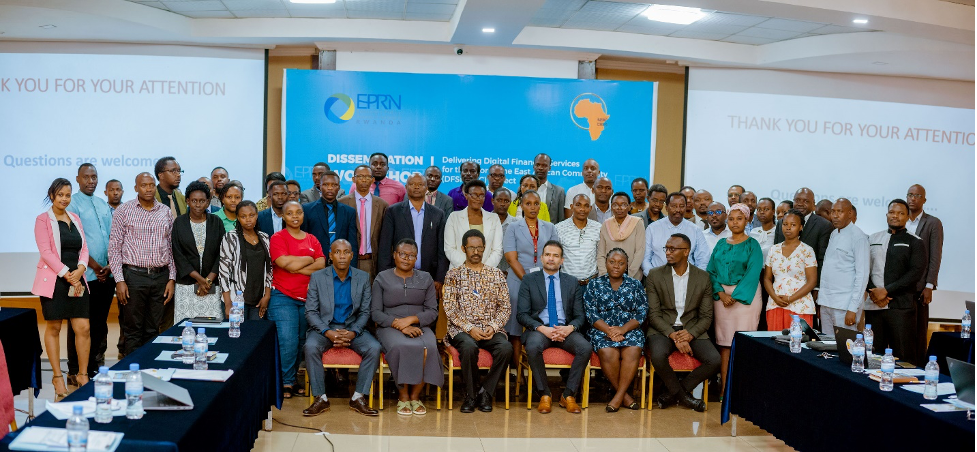
AERC Digital Financial Services Studies Dissemination Workshop in Kigali, Rwanda
September 20, 2023The African Economic Research Consortium (AERC), in partnership with the Economic Policy Research Network hosted dissemination workshop on August 29, 2023, at Lemigo Hotel. The workshop was held under the theme Development and Social Inclusion of (Digital) Financial Services in Rwanda. It featured 90 participants including representatives of public institutions, private sector, civil society, financial institutions, academia, and media. The main objective of this workshop was to disseminate the key findings from four research papers developed under the AERC-BMGF collaborative research project ‘Delivering Digital Financial Services for the Poor in the East African Community (DFSP-EAC)’. The research project was undertaken in six East African Community Economies namely: Kenya, Tanzania, Rwanda, Burundi, Uganda, and South Sudan.
- Disability, digital financial services, and financial inclusion: evidence from Rwanda by Ggombe Kasim Munyegera and Seth Kwizera.
- Development of the digital financial ecosystem in Rwanda: drivers, lessons, and way forward by Ggombe Kasim Munyegera and Agnes Mutuyimana
- Gender, digital financial services, and financial inclusion: empirical evidence from Rwanda by Ggombe Kasim Munyegera.
- Access to digital financial services and women empowerment: evidence from rural Rwanda by Rosemary Botha, Tony Mwenda Kamninga, Methode Tuyisenge.
During the official opening session of the workshop, the welcome remarks were made by Professor Herman Musahara on behalf of Dr. Charles Ruranga, the Legal Presentative of EPRN. Professor Musahara reiterated the importance of research dissemination and the move from merely publishing papers to ensuring the research findings got understood and used by intended audience. He emphasized the need for social inclusion (particularly among those with disability) in financial services and encouraged participants to embrace digital financial services. He noted that in a bid to promote financial inclusion and digital financial services in the country, several policies have been enacted by the government. He added that for innovations that have been undertaken by financial service providers – including financial institutions to succeed, evidence must be an integral component.
Mr. Senvy Maistry, the Chief Communications Officer, AERC gave an overview of the work of AERC, including its three pillars, namely, research, training, and policy, which guides the institution to reach its key objectives. He informed participants that AERC capacity building and research programs have benefitted more than 20,000 Africans. Mr. Senvy explained the context, background and rationale for the Financial Inclusion and Market Development research project, which resonates well with the AERC strategic plan (2020-2025) that emphasizes on improving quality and expanding influence in the region. He further highlighted the rationale for the dissemination workshop as a tool for devising evidence-based solutions to the DFS gap in Rwanda.
The guest of honor, Mr. Chris Songa Musonera from the National Bank of Rwanda mentioned that overall financial inclusion rates in Rwanda are quite high, at 93% of the adult population. However, usage remains relatively low especially among women; for example, women are less represented in formal services specially those offered by banks. He further aobserved that women have a higher propensity to borrow, but they tend to borrow less amounts and also prefer informal groups (ibimina) as source of credit. He noted that currently people, including women, have access to digital loans which gives them access to credit in ways that are different from the traditional channels. According to Mr. Songa, there is need to build supportive infrastructure to boost DFS and support persons with disabilities to access financial services.
The following recommendations were suggested for more inclusiveness in accessing and use of the DFS:
- Enhance financial and digital literacy programs that provide practical financial and digital literacy skills to different groups of people. Where required, the information can be put in an easy-to-understand format depending on the targeted audience.
- Strengthen the implementation of existing policies and regulations. For example, interoperability, cyber security, the building code for physical accessibility, among others.
- There is need for greater information sharing and partnerships among stakeholders including public-private partnerships (PPPs) for telecom infrastructure projects to improve service reliability especially in rural areas.
- Scale up government guarantee schemes (like VUP Umurenge) on credit access for collateral-constrained groups of people.
- Direct more social protection payments via mobile money instead of cash handed.
- Increase access to mobile phones (tax exemptions for some phone categories) to allow more number of phone owners in Rwanda








